257 CD / The Koroliov Series Vol. XXII. feuilles nocturnes
Description
In a sense, this new recording from Evgeni Koroliov, of pieces by Frédéric Chopin that he played in his youth, continues on from his last one (Intermezzi by Johannes Brahms TACET 256). Contemplative, intimate music that reaches out calmly and fondly to the listener, allowing him/her to breathe deeply, forgetting the concerns and worries of the world outside.
7 reviews for 257 CD / The Koroliov Series Vol. XXII. feuilles nocturnes
You must be logged in to post a review.

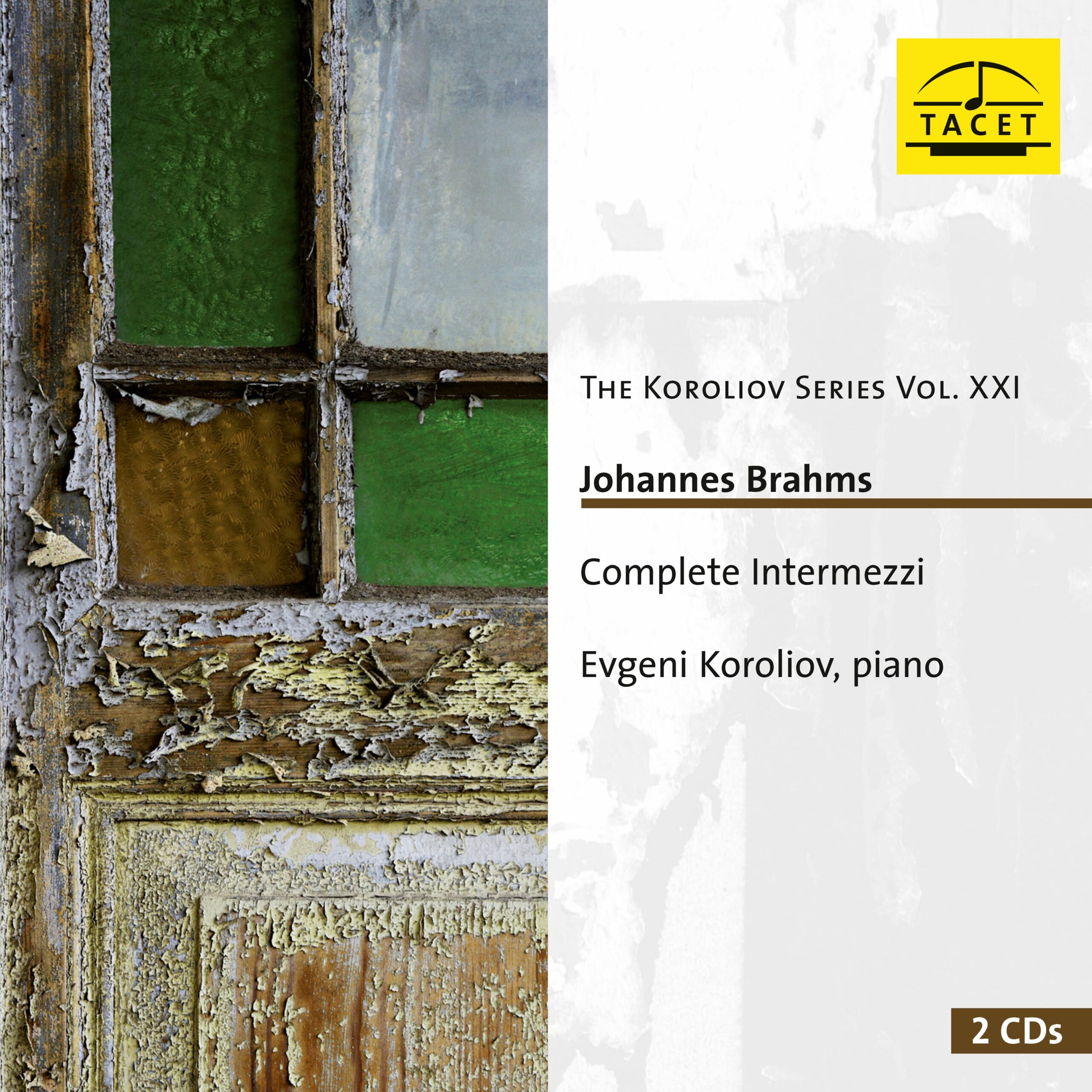
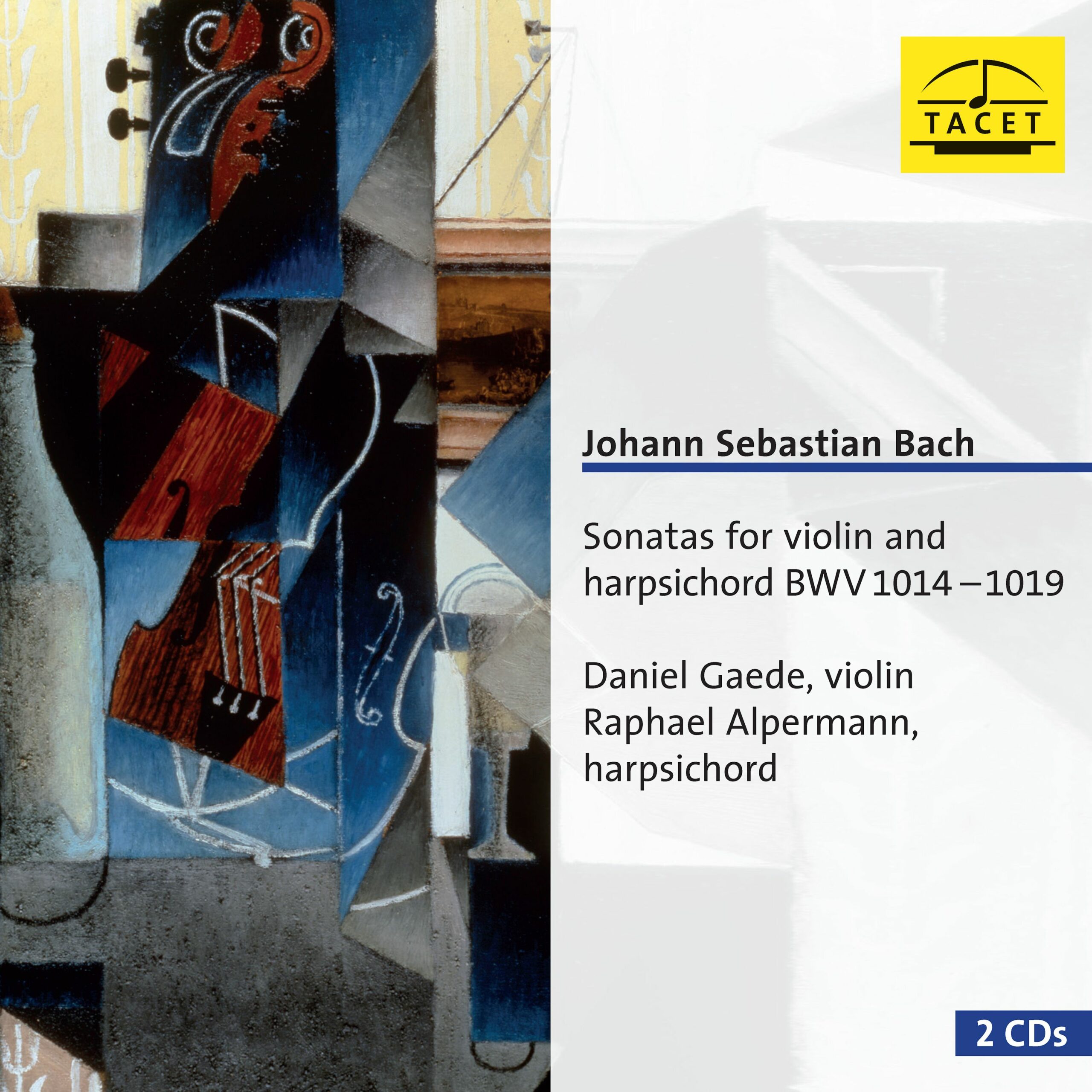
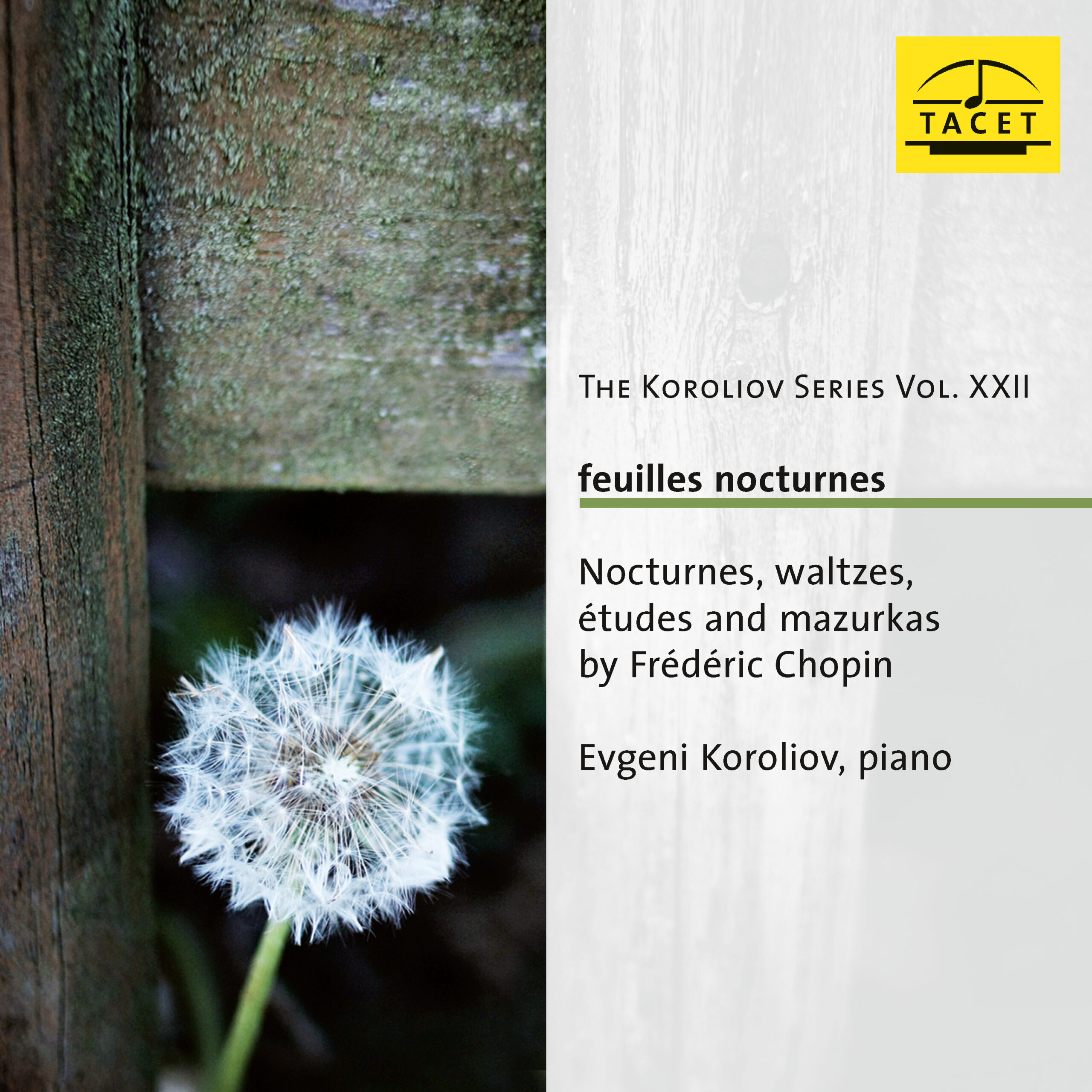
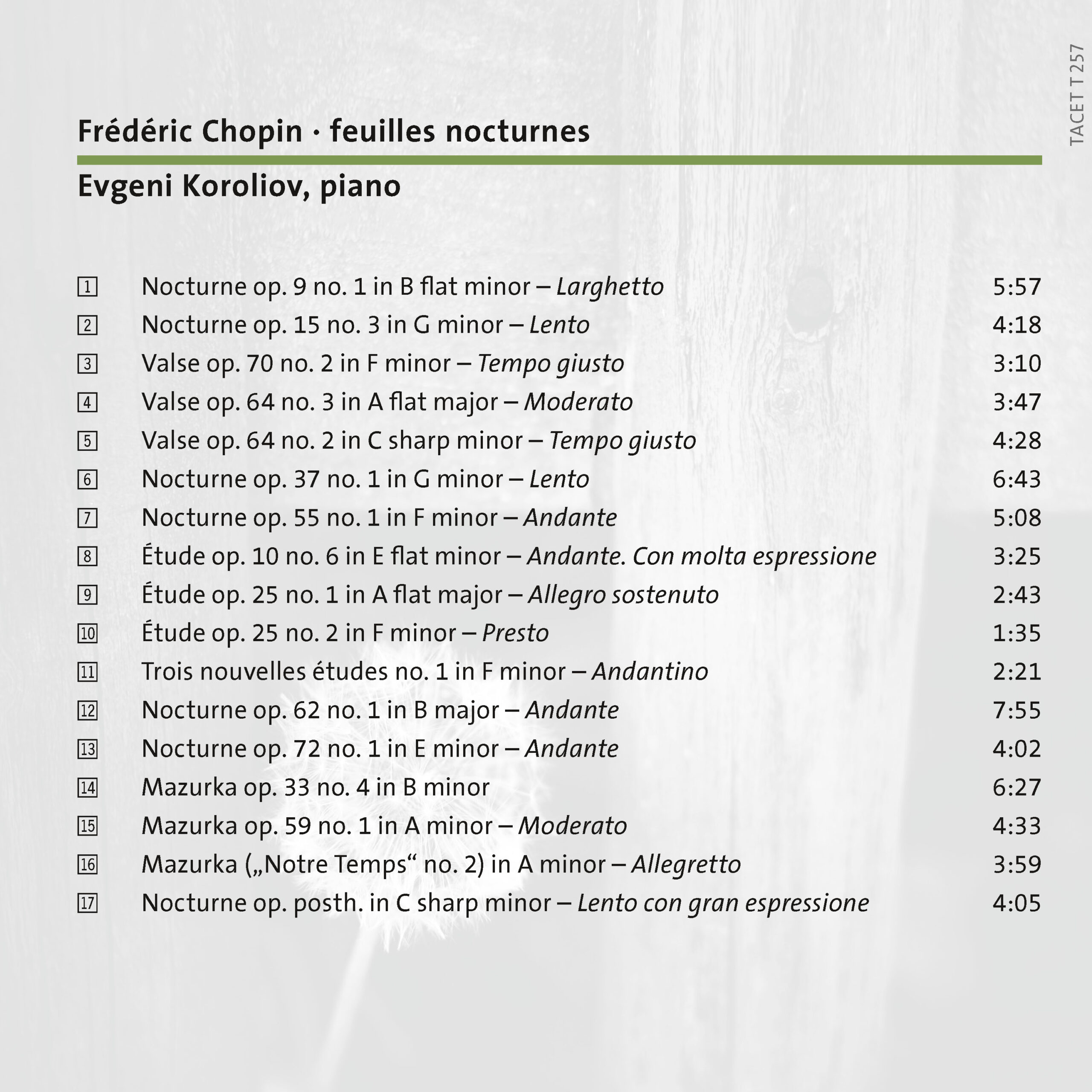




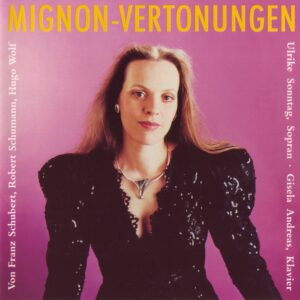

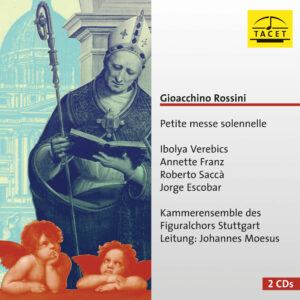
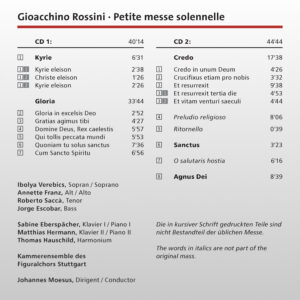
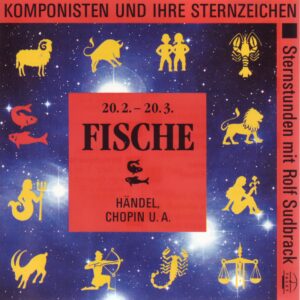
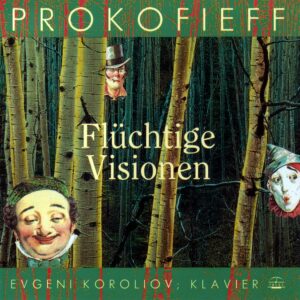
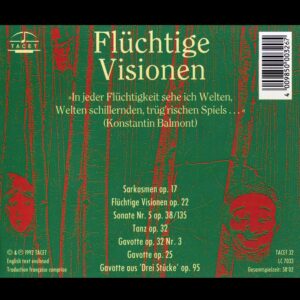
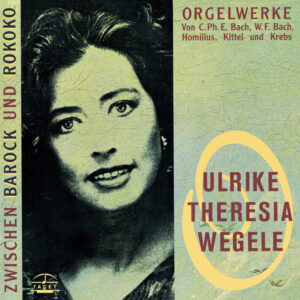
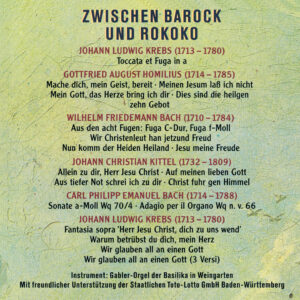

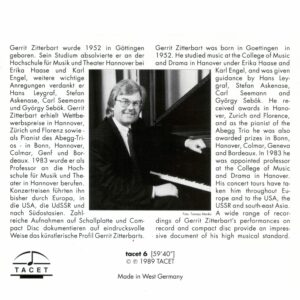
Classica –
Comme les volumes 11 et 13 des « Koroliov Series », le présent volume 22 est consacré à Chopin. Enregistrés avec soin, ces disques sont publiés dans un désordre qui pourrait faire froncer les sourcils s’il n’était dicté par la liberté qu’a le grand pianiste russe, vainqueur du Concours Clara Haskil en 1977, d’enregistrer quand il se sent prêt. L’artiste a ainsi joué Bach, Tchaikovski, Prokofiev, Schubert, Debussy, Schumann, Beethoven, Stravinsky, Chopin, Mozart, Ravel et Brahms en faisant des allers-retours. C’est un musicien encyclopédique et inspiré, modeste comme le sont les maîtres qui, comme lui, attirent à eux bien des jounes confrères.
Ce nouveau disque associe des « Feuilles nocturnes » jouées au superlatif du piano, voire du pianissimo, rêveuses, atmosphériques, fluides, élégantes, princières, « très jouées », à la façon dont Chopin le faisait dans la pénombre d’un soir d’été à Nohant, tel qu’on l’imagine d’après les témoignages d’alors. Du grand art qui entraîne l’audituer dans une histoire infinie qui abolit le temps, qui d’une valse et d’une mazurka fait un nocturne sans renoncer à leur découperythimique, d’une étude un poème sans éluder le brio, d’un nocturne un poème éloquent et mezza voce. Sans jamais que Koroliov renonce à faire entendre chez Chopin ce qui est rèvolutionnaire dans la conduite de l’harmonie et l’èconomie fulgurante du matériau.
Alain Lompech, Classica
English Translation
Wie die Folgen 11 und 13 der „Koroliov Series“ ist auch die vorliegend Folge 22 Chopin gewidmet. Diese sorgfältig aufgenommenen CDs werden in einer Unordnung veröffentlicht, die Stirnrunzeln hervorrufen könnte, wenn sie nicht von der Freiheit des großen russischen Pianisten, der 1977 den Clara-Haskil-Wettbewerb gewann, diktiert würde, Aufnahmen zu machen, wenn er sich bereit fühlt. So spielte der Künstler Bach, Tschaikowski, Prokofjew, Schubert, Debussy, Schumann, Beethoven, Strawinsky, Chopin, Mozart, Ravel und Brahms, wobei er immer wieder hin und her wechselte. Er ist ein enzyklopädischer und inspirierter Musiker, der bescheiden ist, wie es Meister sind, die wie er viele joune Kollegen an sich ziehen.
Diese neue CD verbindet „Feuilles nocturnes“, die im Superlativ des Klaviers, ja sogar im Pianissimo gespielt werden, verträumt, atmosphärisch, fließend, elegant, fürstlich, „sehr gespielt“, so wie Chopin es im Halbdunkel eines Sommerabends in Nohant tat, so wie man es sich nach den damaligen Zeugnissen vorstellen kann. Große Kunst, die den Hörer in eine unendliche Geschichte hineinzieht, die die Zeit aufhebt, die aus einem Walzer und einer Mazurka ein Nocturne macht, ohne auf ihre Zergliederung zu verzichten, aus einer Etüde ein Gedicht, ohne dem Brio auszuweichen, aus einem Nocturne ein eloquentes Gedicht mit mezza voce. Ohne dass Koroliov jemals darauf verzichtet, bei Chopin das Revolutionäre in der Harmonieführung und der fulminanten Sparsamkeit des Materials hörbar zu machen.
Passion Musique et Culture –
Debussy a déjà dit de Chopin : « Chopin est le plus grand de tous parce qu’avec un seul piano, il a tout trouvé. » Très rares sont les pianistes-compositeurs dont l’histoire n’a jamais atténué l’éclat de leur présence, la pérennité de leur œuvre; depuis le début de sa carrière, Chopin est demeuré, et de loin, un grand favori des mélomanes autant des experts que du grand public. Cela tient à plusieurs facteurs mais je pense que l’un des plus fondamentaux réside dans l’amalgame très personnel qu’il a accompli entre l’enracinement de son folklore natal et la virtuosité du bel canto; ainsi, le coeur et l’esprit sont touchés à la fois, les émotions, aussi variées soient-elles, sont au comble du raffinement de l’expression.
C’est ce que j’ai ressenti en écoutant le troisième album qu’Evgeni Koroliov a consacré à Chopin pour le label allemand Tacet. Les subtilités du toucher et la netteté lumineuse de l’articulation s’allient admirablement à un discours judicieusement mesuré. Le jeu grandement admirable de Koroliov n’est jamais corrompu par les emphases qui distordent l’interprétation de la pensée de Chopin et dont sont coupables plusieurs techniciens qui ont besoin de brillance pour nourrir leur ego.
Chopin préférait se produire dans l’intimité amicale du salon bien davantage qu’en concert. À cet égard, il avait affirmé : « Les concerts ne sont jamais de véritable musique; on doit renoncer à y entendre ce qu’il y a de plus beau en art. » À 70 ans, Evgeni Koroliov nous offre justement un récital mûri loin des projecteurs, loin de l’excitation des soirs de premières guindées. C’est un moment de grâce intime, partagé par l’amour sincère d’un artiste non pas assagi mais bien plutôt entièrement serein.
Guy Sauvé
Passion Musique et Culture
English Translation
Debussy sagte einmal über Chopin: „Chopin ist der Größte von allen, weil er mit einem einzigen Klavier alles gefunden hat.“ Es gibt nur sehr wenige Pianisten und Komponisten, bei denen die Geschichte niemals den Glanz ihrer Präsenz und die Dauerhaftigkeit ihres Werks gemindert hat; Chopin ist seit Beginn seiner Karriere bei weitem der größte Favorit der Musikliebhaber, sowohl der Experten als auch der breiten Öffentlichkeit, geblieben. Das hat viele Gründe, aber ich glaube, einer der wichtigsten ist seine ganz persönliche Mischung aus der Verwurzelung in der Folklore seiner Heimat und der Virtuosität des Belcanto, die Herz und Verstand gleichermaßen anspricht und die Emotionen, so unterschiedlich sie auch sein mögen, auf dem Höhepunkt der Raffinesse des Ausdrucks ankommen lässt.
That's how I felt listening to Evgeni Koroliov's third album devoted to Chopin for the German label Tacet. The subtleties of his touch and the luminous clarity of his articulation combine admirably with a judiciously measured discourse. Koroliov's highly admirable playing is never corrupted by the emphases that distort the interpretation of Chopin's thought, and of which many technicians who need brilliance to feed their egos are guilty.
Chopin zog es vor, in der freundschaftlichen Atmosphäre des Salons aufzutreten und nicht in Konzerten. Er sagte: „Konzerte sind niemals wahre Musik; man muss darauf verzichten, in ihnen das Schönste der Kunst zu hören.“ Der 70-jährige Evgeni Koroliov bietet uns ein Konzert, das fernab des Scheinwerferlichts und der Aufregung von Premierenabenden gereift ist. Es ist ein intimer Moment der Gnade, geteilt durch die aufrichtige Liebe eines Künstlers, der nicht ruhiger, sondern vielmehr völlig gelassen geworden ist.
Facebook: Passion Musique et Culture
klassik.com –
--> original review
(...) You almost want to cry, with emotion - the minds behind Tacet seem committed to the cause.
LeDevoir –
--> original review
„Seine CD ist ein Wunder.“
Christophe Huss
Klassik heute –
--> original review
The reviewer is filled with anticipation when he receives a CD from the Tacet label. Even greater anticipation when it is a CD with Evgeni Koroliov. And the reviewer had great pleasure listening to this very personal selection of Nocturnes, Études, Waltzes and Mazurkas by Frédéric Chopin. The pianist Leif Ove Andsnes once said that some compositions can stand mediocre interpretations - but Chopin's works cannot. With Koroliov, there is really nothing to fear.
Geheimnis des Erstaunens
For him, every single note is precious, his heartfelt singing tone makes everything shine in all colors, he does not play melodies with accompaniment, but weaves everything together in the most relational way, his playing takes hold of you immediately, thrills and enchants. Koroliov is probably not an "instinctive player" like Arthur Rubinstein, but a "reflective player - who, however, lets you forget during playing that he has reflected thoroughly. One hears - and sees it when reading the notes - how Koroliov pays the utmost attention to all performance signs, how suspenseful and then surprisingly he shapes every modulation, how masterfully he operates the pedal, how fluently he integrates the precious single notes into a melodic flow that carries one away, that one gladly entrusts oneself to, in which one would like to swim comfortably. There is almost no end to the raptures. As if Koroliov had read André Gide's "Notes on Chopin," where he writes: "Every modulation in Chopin - none is ever banal or foreseen - must preserve this freshness, this almost anxious excitement at a dawning newness, this mystery of astonishment to which the daring soul exposes itself on untraveled paths where one discovers the landscape only little by little." Indeed, Koroliov transforms the mystery of wonder into the joy of showing - and it all flows into the gratitude of hearing.
Melancholische Eleganz
To put it in detail: the Waltz op. 70 No. 2 comes across as fragrantly colorful, the Waltz op. 64 No. 3 floats in wonderful sounding and pulling legato and somewhat tired-melancholic elegance. In the Étude op. 10 No. 6, the polyphonic movement shines through clearly against all impressionistic dissolution tendencies, the Étude op. 25 No. 2 shines in pastel colors, and the extremely attractive balance of the opposing rhythms in the first of the Trois nouvelles études makes the listener fall into a pleasantly dazed giddiness.
Klang der Tuberose
Above all, however, the Nocturnes provide the most intense listening pleasure. Fantastically, the Nocturne op. 55 no. 1 dissolves at the end into triplet starry glitter; lost in dreams, the sound in the Nocturne op. 62 no. 1 before the trill that leads the A-flat major back to B minor: in the Anglo-Saxon world, this Nocturne is called the "Tuberose" because the main melody has a "fruity charm" and its return in the recapitulation is faint "with a sick, rich smell," as James Huneker puts it.
The Nocturne Op. 37 No. 1 is the reviewer's favorite: Here there is a continual urging and receding, the bass accompaniment in bars 17/18 seems like a fervent repeated plea, and for once the chorale in the middle section sings not in accelerated tempo but in pilgrimage song step tempo with a dying slowdown at the end so that everything settles comfortably back into the elegiac lullaby chant, this reprise making the theme seem even more painful and even more wistful than at the beginning: the theme has been through something, has experienced something, has matured.
Only the three Mazurkas the reviewer wished were more powerful, more energetic, more pithy, more Chevaleresque, less ethereal, less tainted by the Nocturnes. There Rubinstein is preferable to the reviewer - but only there. The sonorously rich sound of the Steinway in the room of the Jesus Christ Church in Berlin is excellently captured, and Wolfgang Wendel describes Koroliov's relationship to Chopin in the booklet in a charmingly personal way.
Rainer W. Janka
concerti –
--> original review
You should take your time for this record. It is best to listen to it in the evening, when everything is quiet. And it is best to listen to it in its entirety, from the first to the last piece, because only then can the subtle dramaturgy of this compilation of Chopin's works, whose atmosphere is aptly reflected in the album's title "feuilles nocturnes", "nocturnal leaves", be revealed. The magical somnambulistic mood established by two nocturnes at the beginning is temporarily abandoned sometimes with friendly waltzes, sometimes with dazzlingly played etudes, only to be resumed in the rondo-like recurring nocturnes. Evgeni Koroliov has already shown with his recording of Chopin's Mazurkas that he is more interested in the night sides of Chopin's music than in its potential for virtuoso self-expression. And on this CD, too, the great art of the performer is shown above all in a nuance of touch that enables him to differentiate Chopin's works tonally and atmospherically in a way that perhaps only Grigory Sokolov currently manages.
Frank Armbruster
Pizzicato –
--> original review
This CD has no special theme, apart from the fact that Evgeny Koroliov says that he played all these pieces in his childhood and youth and they are full of back fond memories.So it is a very personal program with pieces for which he had a preference and which today, in reflective, mature interpretations, are unanimously convincing. It is a finely nuanced, poetic Chopin, in which simple charm is subordinated to the purity of a perfectly phrased and controlled playing. The music flows with ease without any exaggeration and Koroliov combines a basically romantic, often tender sensitivity with an impressively clear and ultimately pianistically very restrained playing. But that’s what makes this CD so rich, so effective, and so beautiful.
It is thus a very personal program of pieces for which he had a fondness and which today, in reflective, mature interpretations, are unanimously convincing. This is finely nuanced, poetic Chopin, where simple charm is secondary to purity of execution, and where technique provides exquisite phrasing and perfect control of the playing. The music flows with ease without any exaggeration. Koroliov combines an essentially romantic, often tender sensibility with captivatingly clear playing that is ultimately also very restrained pianistically. But that is what makes this CD so rich, so effective, so beautiful.
Remy Franck